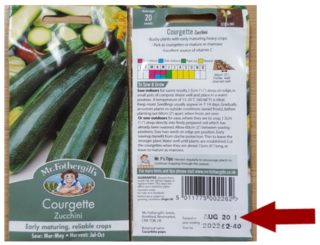Rogue zucchini seeds are suspected to be behind several cases of illness in England.
Zucchinis, also called courgettes, contain a naturally occurring compound. When this is at a high enough level it can lead to symptoms such as nausea and diarrhea.
Four families in Castle Acre, Norfolk, reported feeling unwell after eating produce they had grown, according to the BBC.
The Sun newspaper reported a woman needed hospital treatment after being poisoned by courgettes she had grown. They came from Unwins seeds and parent company Westland told The Sun that it had temporarily suspended shipments as a precaution while it investigated the issue.
Product recall
Another firm, Mr Fothergill’s, recalled a batch of Courgette Zucchini that could contain seeds that produce bitter tasting fruits. The affected item has Batch code I on the back of the packet.

A statement from Mr Fothergill’s said such a problem is extremely rare, but not unknown. It advised people not to eat the zucchini and discard the plants.
“It can come from issues with cross-pollination in the seed production cycle and is untraceable before growing out again for harvest. Please be assured that we take every precaution to maintain the quality of our seed stock. In this instance we have withdrawn the rogue batch from all sales outlets and in-house stocks,” said the company.
“We recommend that if you have grown this variety from a packet with the batch code I that you do not ingest the fruits without taste testing for bitterness. A taste-test is a safe thing to do to detect if you have an affected plant which will be extremely bitter slice the top off the fruit and simply touch your tongue on it.”
All remaining stock in the warehouse, unpacked seeds and seeds in retail outlets are being recovered and destroyed.
Possible cause of problem
The bitter taste of some fruit is caused by an over-production of plant defense chemicals called cucurbitacins. This is mainly a problem in courgettes and summer squash and is caused primarily by a mutation within the plant. The problem is more likely when plants are grown from saved seeds, where inadvertent cross-pollination may have occurred, according to the Royal Horticultural Society.
High temperatures, dryness and other stresses when growing can also lead to an increase in cucurbitacins.
Mr Fothergill’s has tracked the issue to one batch of seed which came from a grower with “meticulous” growing and husbandry routines.
“Normally cucurbitacins exist in very small amounts but genetic issues in the production cycle very occasionally deliver larger amounts into the seed which cause the bitter flavor. It’s impossible to test for in the seed itself and we have never had a batch of seed like this in our 40 plus year history.”
(To sign up for a free subscription to Food Safety News, click here.)

